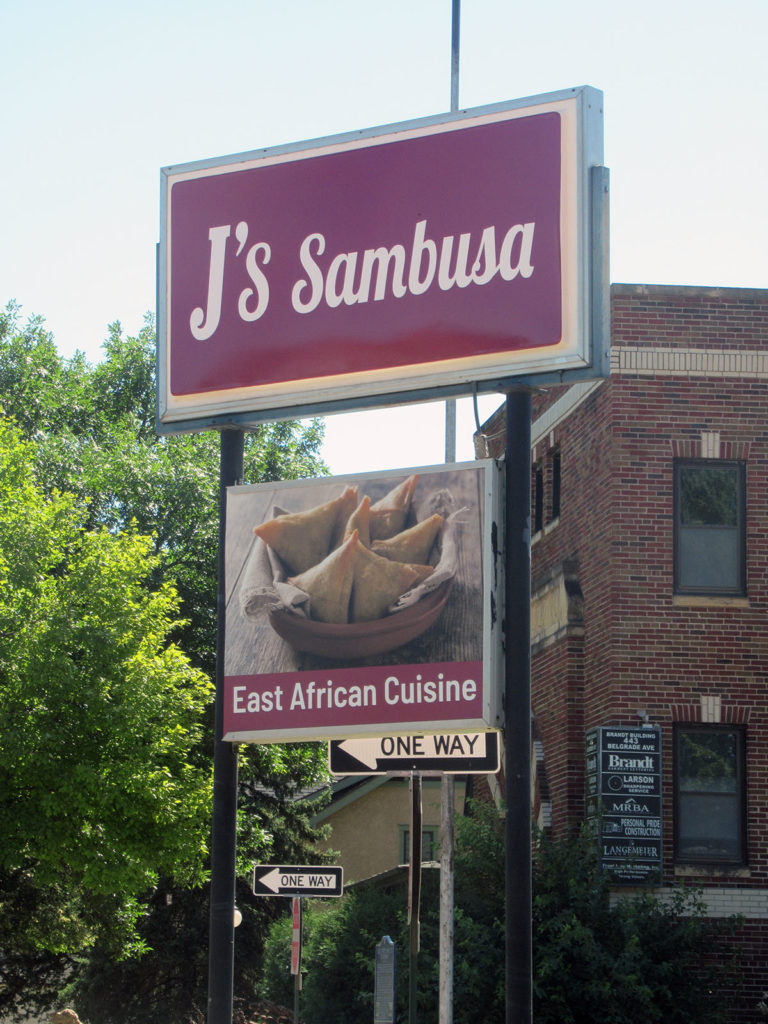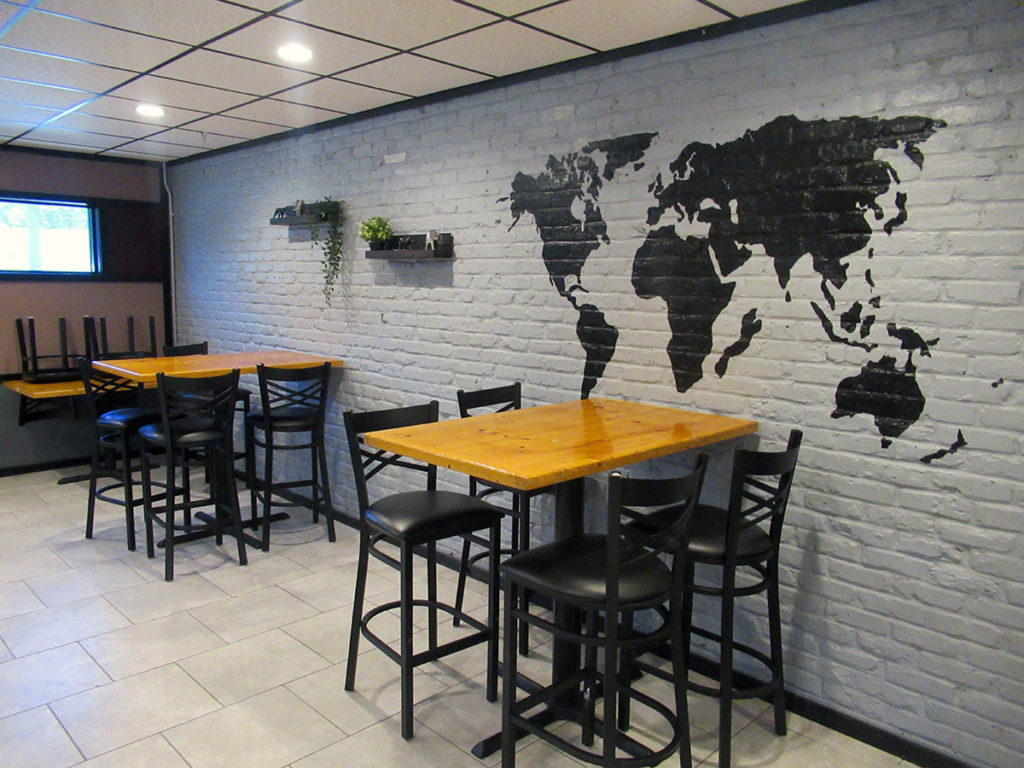When Nasra “Jamila” Ibrahim was a young girl living in Somalia, she would watch her mother carefully prepare sambusas, a traditional eastern African dish. Also known as “samosas,” these triangle-shaped appetizers are made of thin pastry dough and stuffed with beef, chicken, or vegetables.
The process was a long one, starting with making the dough from scratch, stuffing the dough wrappers and deep-frying everything at the end. While it could take an entire morning, Ibrahim always enjoyed the time she spent creating the traditional dish.
“It takes time, but it’s worth it,” she said. “It’s a cultural thing, especially during Ramadan. We start learning to make sambusa when we’re nine or ten years old. Almost every Somali girl knows how to make sambusa.”
It has been more than 25 years since Ibrahim stood in her kitchen in Somalia, folding sambusas with her family members. But now, she’s bringing that taste of Somalia to southern Minnesota with her new restaurant, J’s Sambusa, which will have its grand opening on Thursday.
A Normal Childhood
Ibrahim was born in Somalia in 1970, the youngest of four siblings. Her family lived in the city of Mogadishu, Somalia’s capital, and her father worked at the American embassy there.
We’ll try to make people happy. My door is open to anybody. I’m planning to bring people together—and food brings people together.Nasra “Jamila” Ibrahim
Ibrahim said people often assume that she and her family had no modern conveniences because they lived in Africa, but that wasn’t the case. Mogadishu was an advanced city with “normal” amenities such as electricity and running water, and the city had a wide range of thriving businesses and services.
“Sometimes, when people hear ‘Africa’ or ‘Somalia,’ what we see in the TV is bushes and animals,” Ibrahim said. “But we used to live in a big city, and we had everything. We had schools, theaters, arts, sports, music… We had everything, before the war happened. There are some Somali that didn’t have that opportunity to see how it used to be. Luckily, I was there, and I had a good time. We used to do whatever other kids used to do.”
Ibrahim said that there was one thing that not many Somalian families owned: a refrigerator. This was because Somalians typically bought fresh produce from the local market every day.
“The food was always fresh and always organic,” Ibrahim said. “Everybody went to the market every day. A few people had refrigerators, but you didn’t need them, because you didn’t need to save food. If you had leftovers, you gave them to the poor. Every day, my mom used to go to the market. I miss that.”
When Ibrahim was 13, her mother moved to Saudi Arabia to be with Ibrahim’s older sister and her family. At that time, Ibrahim’s older brother, Abdi Rahman, stepped in to help raise her. He was 14 years her senior, and he became a second father to her, especially after her father passed away a few years later.
“My brother’s the one who raised me,” Ibrahim said. “He was everything to me. He was my hero. He was the one who pushed me to learn English and to learn typing. He made sure that I had everything I wanted. He was very protective… He still is!”
Civil War
In the late 1980s, civil unrest in Somalia spilled into an all-out war, which eventually led to the overthrow of the country’s government in 1991. By 1992, the conflict had become so dangerous that many Somalians had started fleeing the country.
Ibrahim said at first, her family decided to leave Mogadishu and go to another city that wasn’t as affected by the war.
“We were all in danger, because it was not only [different factions] attacking—the government was also throwing bombs,” she recalled. “The day we left, it was 5 a.m. in the morning. We walked away from our home. And in the evening, the bomb hit one side of our home. One side of our home was destroyed. One of the neighbors was telling us, ‘Stay today. We can go together,’ and we said no. If we would have stayed, God knows what would have happened. We walked away from everything we had in our home. No pictures, no memories… We just walked away, just for our lives.”
Ibrahim and her family walked nearly 70 miles to the next nearest city, Afgoye, taking only the clothes on their backs and a few pieces of food to sustain them. When they reached the city, they stayed in a stadium the first night before trying to find a new place to settle.
“It was very hard,” Ibrahim said. “It was hard to walk away from our home. We never looked back. And we still haven’t gone back.”
Eventually, Ibrahim’s family settled into a new life, though they were scattered among three cities. Ibrahim stayed with her brother, Abdi. Every day, he would take her to work with him, since it was too dangerous for her to stay home alone.
“I used to be with him all the time,” she said. “He couldn’t even leave me at home because girls were getting raped. You never knew what was going to happen. I remember if I left the house, we didn’t have an ID or anything, so I used to carry a novel where I put my name and my brother’s name and where they could find him, because you could die. There were a lot of people who died in the street, and nobody knew them, [so] they were just buried. And then the family didn’t know if you were alive or dead. That was a danger. So, all the time, when I left the house, I had to carry that with me, not knowing if I’d come back or not.”
In 1992, Ibrahim’s family decided to leave Somalia for good, fleeing to nearby Kenya. Ibrahim’s brother, however, refused to go, hoping that the conflict would end sooner than later.
“We decided to leave the country, because the war was getting worse,” Ibrahim said. “My brother refused to leave, so I left him, without him knowing. I had all my documents. My other siblings joined with me, and we left him… We called him [in Kenya] and told him.”
Ibrahim had learned that refugees with connections to the American embassy were being given priority to travel to the U.S., so she and her family applied. By this time, her father had passed away, but her family was still able to go through the application process. Because of her late father’s employee status, the process took only 11 months, and Ibrahim wasn’t required to stay at a refugee camp; instead, she and her family would travel to the camp to complete paperwork but could live in nearby Nairobi.
“Our process was quick,” Ibrahim said. “It took only 11 months to get to the U.S. Some people were waiting 10 years.”
A New Life
Ibrahim arrived in Portland, Maine in 1994, where she stayed for only a few months before traveling to Atlanta, Georgia, where more friends and family members had relocated. Ibrahim already spoke English at this time since she had learned it at her private school, but she said there were still a large culture shock as she adjusted to her new life.

“When I came to the U.S., that was the first time that I noticed that I’m different than other people,” she said. “All my life, I used to live in Africa, and everybody looks the same. Nobody sees your color as different. When you come to a different country, especially like the U.S., I felt that I was different. At the beginning, I was shocked because the culture was different. I was lucky, [since] I knew English. At least I could speak and take care of myself. I wasn’t fluent, but I never needed an interpreter. But there was a lot of adjustment.”
One area that was particularly different was the food. Ibrahim said when she first arrived in America, she only ate cheeseburgers, because she recognized them from her brother’s old restaurant in Somalia.
…when I moved to Mankato, I found a lot of good people. I really love Mankato.Nasra “Jamila” Ibrahim
“At the beginning, the taste was different, the meat was different, the spice was different,” Ibrahim recalled, adding that Somalian spices are often much fresher because they’re taken straight off the plant and not processed before using them. “At the beginning, I was shocked… Sometimes you didn’t even know what to call what you wanted. It may be in the store, but you didn’t know the name. From 1994 until now, a lot of things changed, because now we have a lot of spices from our country that I can find here. But when I came, we didn’t have all that. In Maine, there was no African store. After a while, people adapted and opened stores, and we have our spices now.”
In Georgia, Ibrahim met her husband, Habri Hassan, whom she married in 1995. They had two sons, and eventually they decided to move to Minnesota to be closer to her family, who lived in the Twin Cities area. They settled in Eagle Lake in 2006, and Ibrahim began working as an AmeriCorps member at the Lincoln Community Center, eventually transitioning to a school liaison position. Her husband also works for the school district.
“Living in a big city [like Atlanta], you don’t even know your neighbor,” Ibrahim said. “But when I moved to Mankato, I found a lot of good people. I really love Mankato.”
A Surprising Dream
According to Ibrahim, starting her own restaurant was never something she planned—but it was something that always intrigued her.
“Somehow, something in me used to like restaurants,” she said. “When I went to Dubai for vacation, I was sitting at a restaurant, and I saw the menu. I took a picture and said, ‘This is beautiful. Let me take a picture, in case I open a restaurant.’ And I wasn’t even thinking about opening a restaurant when I was saying that.”
Ibrahim had gained experience in the restaurant industry when she worked at her brother’s restaurant back in Somalia, where she mostly managed the finances but also cooked when they were short-handed. But she didn’t think about starting her own restaurant until she learned that the old American Bar location in North Mankato was up for sale. Ibrahim and her husband bought the building in October 2019, and she started planning out a menu, which mostly consists of Somalian staples such as sambusas, Somali rice and pasta.
“I like to invite people to my house and show them how to cook and make sambusa,” Ibrahim said. “The two things they loved was the sambusa and the pasta I make. I’m using my own family recipe for the sambusa. Most people [from Somalia] make sambusa, but I make mine different. Mine has a different taste than other sambusas, because I have a little trick.”

Ibrahim originally planned to open her restaurant in March, but the COVID-19 situation made her postpone her plans. She considered giving up on the restaurant idea because of the pandemic, but her friends urged her to keep moving forward with it.
“When [COVID-19] happened, I decided not to open,” she said. “But I couldn’t even walk anywhere without people asking me, ‘When are you opening?’”
Ibrahim had a soft opening on Monday, with plans for a grand opening this Thursday. Right now, she has a few family friends helping in the kitchen, but she said she hopes to hire more employees once business picks up. She doesn’t have any indoor dining available yet, but customers can eat outside on her patio or order takeout.
“We’ll try to make people happy,” Ibrahim said. “My door is open to anybody. I’m planning to bring people together—and food brings people together.”




